Financial Accounting 2022 Theory
VerifiedAdded on 2022/09/15
|12
|3475
|17
AI Summary
Contribute Materials
Your contribution can guide someone’s learning journey. Share your
documents today.
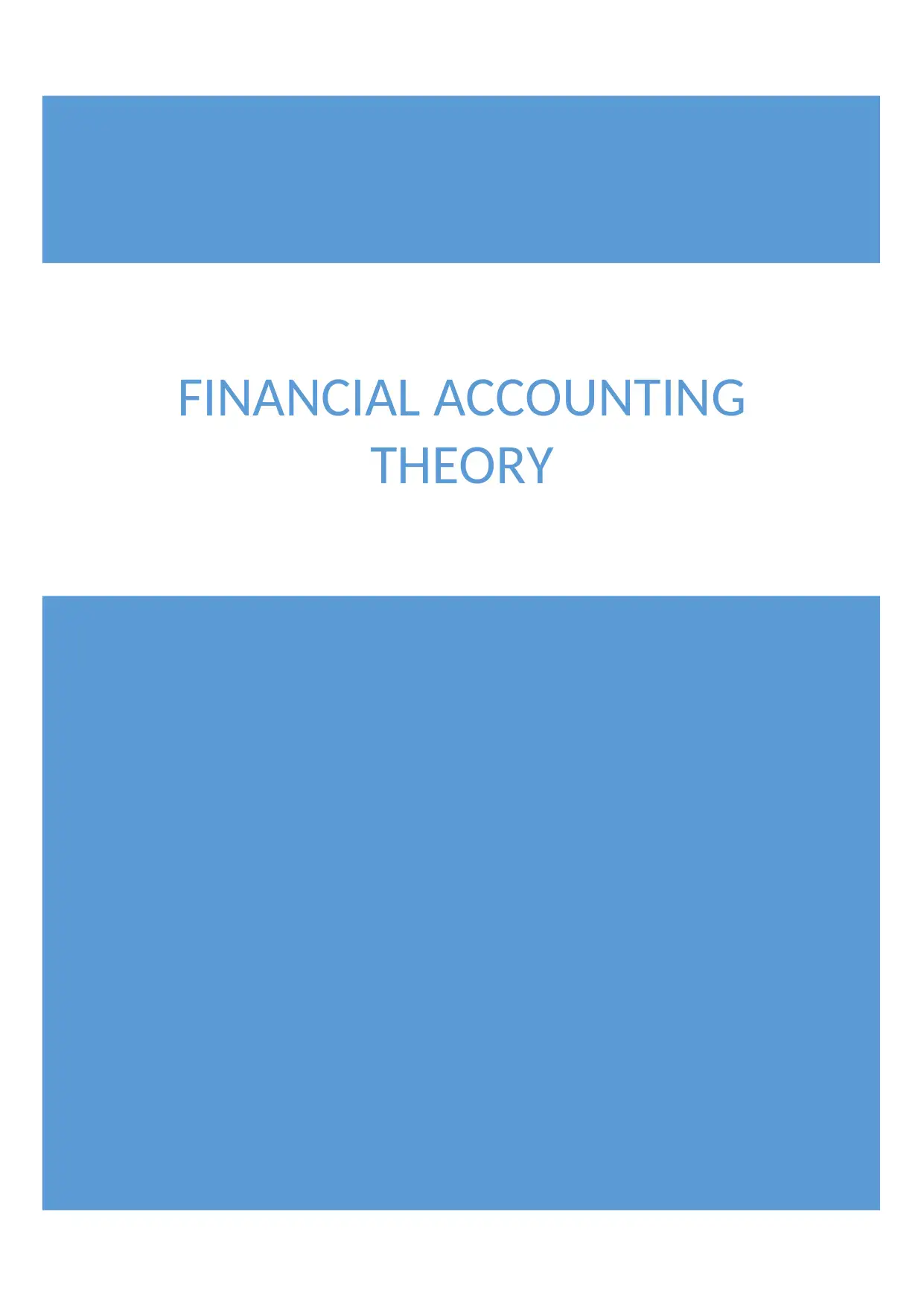
FINANCIAL ACCOUNTING
THEORY
THEORY
Secure Best Marks with AI Grader
Need help grading? Try our AI Grader for instant feedback on your assignments.
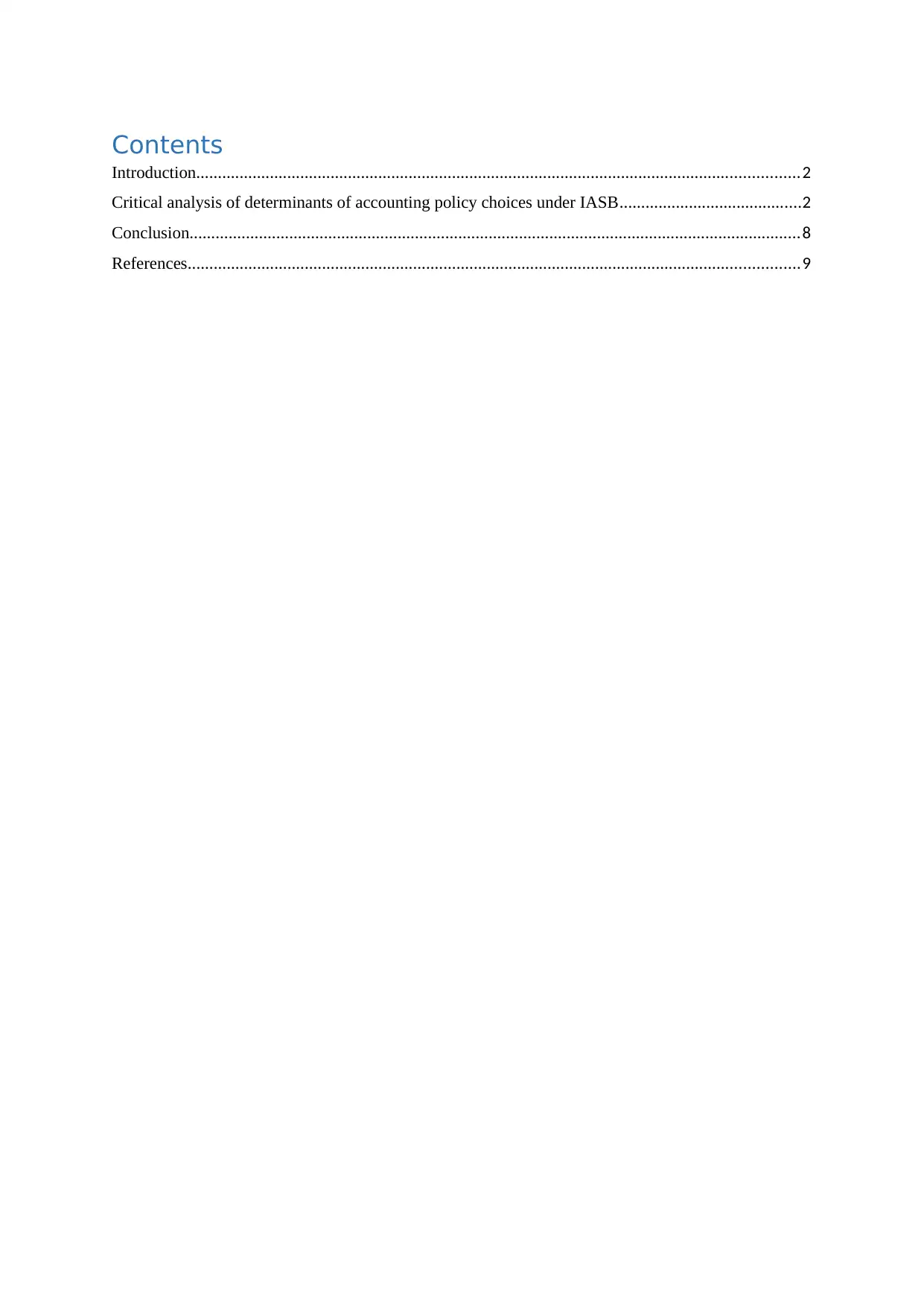
Contents
Introduction...........................................................................................................................................2
Critical analysis of determinants of accounting policy choices under IASB..........................................2
Conclusion.............................................................................................................................................8
References.............................................................................................................................................9
Introduction...........................................................................................................................................2
Critical analysis of determinants of accounting policy choices under IASB..........................................2
Conclusion.............................................................................................................................................8
References.............................................................................................................................................9
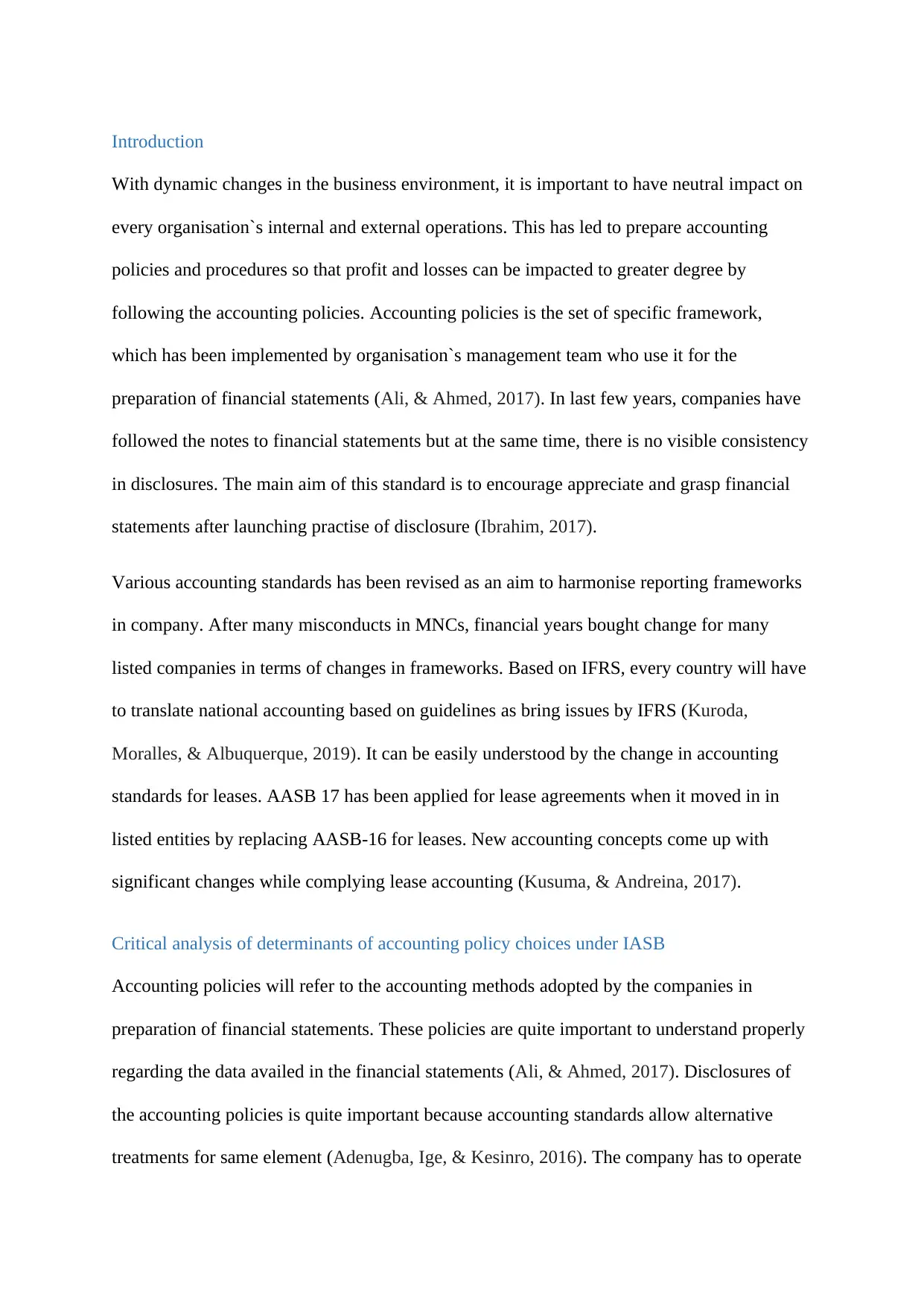
Introduction
With dynamic changes in the business environment, it is important to have neutral impact on
every organisation`s internal and external operations. This has led to prepare accounting
policies and procedures so that profit and losses can be impacted to greater degree by
following the accounting policies. Accounting policies is the set of specific framework,
which has been implemented by organisation`s management team who use it for the
preparation of financial statements (Ali, & Ahmed, 2017). In last few years, companies have
followed the notes to financial statements but at the same time, there is no visible consistency
in disclosures. The main aim of this standard is to encourage appreciate and grasp financial
statements after launching practise of disclosure (Ibrahim, 2017).
Various accounting standards has been revised as an aim to harmonise reporting frameworks
in company. After many misconducts in MNCs, financial years bought change for many
listed companies in terms of changes in frameworks. Based on IFRS, every country will have
to translate national accounting based on guidelines as bring issues by IFRS (Kuroda,
Moralles, & Albuquerque, 2019). It can be easily understood by the change in accounting
standards for leases. AASB 17 has been applied for lease agreements when it moved in in
listed entities by replacing AASB-16 for leases. New accounting concepts come up with
significant changes while complying lease accounting (Kusuma, & Andreina, 2017).
Critical analysis of determinants of accounting policy choices under IASB
Accounting policies will refer to the accounting methods adopted by the companies in
preparation of financial statements. These policies are quite important to understand properly
regarding the data availed in the financial statements (Ali, & Ahmed, 2017). Disclosures of
the accounting policies is quite important because accounting standards allow alternative
treatments for same element (Adenugba, Ige, & Kesinro, 2016). The company has to operate
With dynamic changes in the business environment, it is important to have neutral impact on
every organisation`s internal and external operations. This has led to prepare accounting
policies and procedures so that profit and losses can be impacted to greater degree by
following the accounting policies. Accounting policies is the set of specific framework,
which has been implemented by organisation`s management team who use it for the
preparation of financial statements (Ali, & Ahmed, 2017). In last few years, companies have
followed the notes to financial statements but at the same time, there is no visible consistency
in disclosures. The main aim of this standard is to encourage appreciate and grasp financial
statements after launching practise of disclosure (Ibrahim, 2017).
Various accounting standards has been revised as an aim to harmonise reporting frameworks
in company. After many misconducts in MNCs, financial years bought change for many
listed companies in terms of changes in frameworks. Based on IFRS, every country will have
to translate national accounting based on guidelines as bring issues by IFRS (Kuroda,
Moralles, & Albuquerque, 2019). It can be easily understood by the change in accounting
standards for leases. AASB 17 has been applied for lease agreements when it moved in in
listed entities by replacing AASB-16 for leases. New accounting concepts come up with
significant changes while complying lease accounting (Kusuma, & Andreina, 2017).
Critical analysis of determinants of accounting policy choices under IASB
Accounting policies will refer to the accounting methods adopted by the companies in
preparation of financial statements. These policies are quite important to understand properly
regarding the data availed in the financial statements (Ali, & Ahmed, 2017). Disclosures of
the accounting policies is quite important because accounting standards allow alternative
treatments for same element (Adenugba, Ige, & Kesinro, 2016). The company has to operate
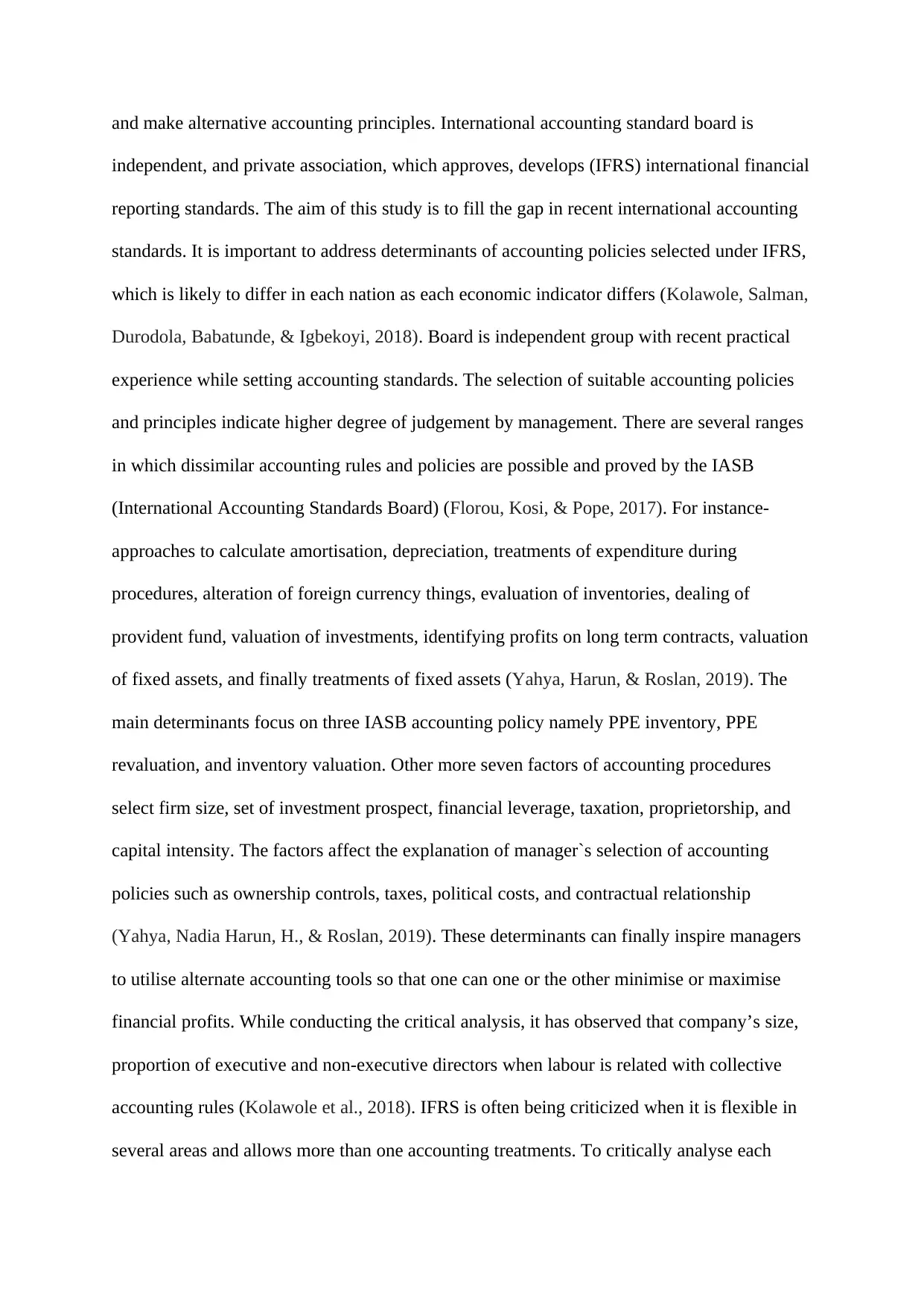
and make alternative accounting principles. International accounting standard board is
independent, and private association, which approves, develops (IFRS) international financial
reporting standards. The aim of this study is to fill the gap in recent international accounting
standards. It is important to address determinants of accounting policies selected under IFRS,
which is likely to differ in each nation as each economic indicator differs (Kolawole, Salman,
Durodola, Babatunde, & Igbekoyi, 2018). Board is independent group with recent practical
experience while setting accounting standards. The selection of suitable accounting policies
and principles indicate higher degree of judgement by management. There are several ranges
in which dissimilar accounting rules and policies are possible and proved by the IASB
(International Accounting Standards Board) (Florou, Kosi, & Pope, 2017). For instance-
approaches to calculate amortisation, depreciation, treatments of expenditure during
procedures, alteration of foreign currency things, evaluation of inventories, dealing of
provident fund, valuation of investments, identifying profits on long term contracts, valuation
of fixed assets, and finally treatments of fixed assets (Yahya, Harun, & Roslan, 2019). The
main determinants focus on three IASB accounting policy namely PPE inventory, PPE
revaluation, and inventory valuation. Other more seven factors of accounting procedures
select firm size, set of investment prospect, financial leverage, taxation, proprietorship, and
capital intensity. The factors affect the explanation of manager`s selection of accounting
policies such as ownership controls, taxes, political costs, and contractual relationship
(Yahya, Nadia Harun, H., & Roslan, 2019). These determinants can finally inspire managers
to utilise alternate accounting tools so that one can one or the other minimise or maximise
financial profits. While conducting the critical analysis, it has observed that company’s size,
proportion of executive and non-executive directors when labour is related with collective
accounting rules (Kolawole et al., 2018). IFRS is often being criticized when it is flexible in
several areas and allows more than one accounting treatments. To critically analyse each
independent, and private association, which approves, develops (IFRS) international financial
reporting standards. The aim of this study is to fill the gap in recent international accounting
standards. It is important to address determinants of accounting policies selected under IFRS,
which is likely to differ in each nation as each economic indicator differs (Kolawole, Salman,
Durodola, Babatunde, & Igbekoyi, 2018). Board is independent group with recent practical
experience while setting accounting standards. The selection of suitable accounting policies
and principles indicate higher degree of judgement by management. There are several ranges
in which dissimilar accounting rules and policies are possible and proved by the IASB
(International Accounting Standards Board) (Florou, Kosi, & Pope, 2017). For instance-
approaches to calculate amortisation, depreciation, treatments of expenditure during
procedures, alteration of foreign currency things, evaluation of inventories, dealing of
provident fund, valuation of investments, identifying profits on long term contracts, valuation
of fixed assets, and finally treatments of fixed assets (Yahya, Harun, & Roslan, 2019). The
main determinants focus on three IASB accounting policy namely PPE inventory, PPE
revaluation, and inventory valuation. Other more seven factors of accounting procedures
select firm size, set of investment prospect, financial leverage, taxation, proprietorship, and
capital intensity. The factors affect the explanation of manager`s selection of accounting
policies such as ownership controls, taxes, political costs, and contractual relationship
(Yahya, Nadia Harun, H., & Roslan, 2019). These determinants can finally inspire managers
to utilise alternate accounting tools so that one can one or the other minimise or maximise
financial profits. While conducting the critical analysis, it has observed that company’s size,
proportion of executive and non-executive directors when labour is related with collective
accounting rules (Kolawole et al., 2018). IFRS is often being criticized when it is flexible in
several areas and allows more than one accounting treatments. To critically analyse each
Secure Best Marks with AI Grader
Need help grading? Try our AI Grader for instant feedback on your assignments.
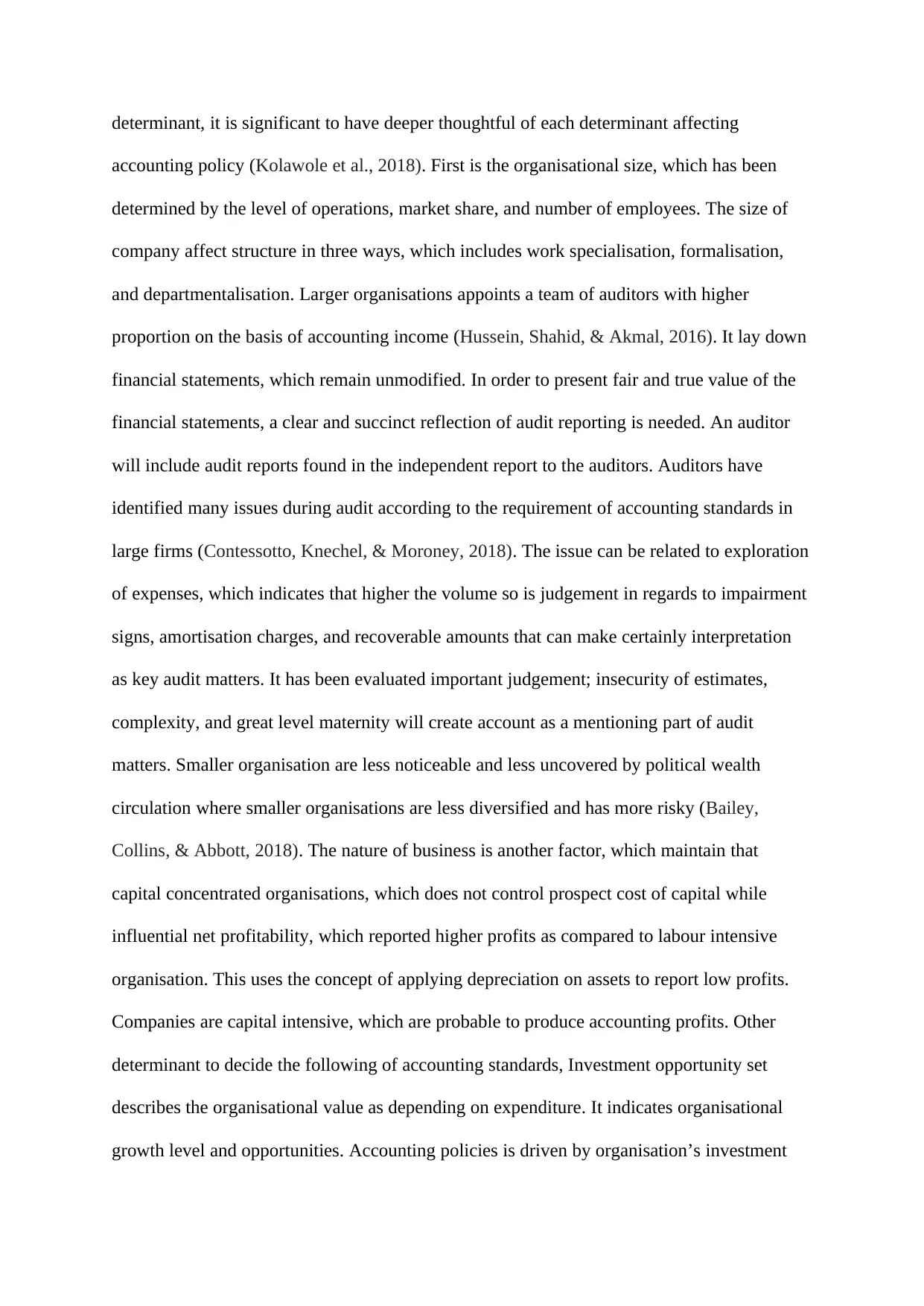
determinant, it is significant to have deeper thoughtful of each determinant affecting
accounting policy (Kolawole et al., 2018). First is the organisational size, which has been
determined by the level of operations, market share, and number of employees. The size of
company affect structure in three ways, which includes work specialisation, formalisation,
and departmentalisation. Larger organisations appoints a team of auditors with higher
proportion on the basis of accounting income (Hussein, Shahid, & Akmal, 2016). It lay down
financial statements, which remain unmodified. In order to present fair and true value of the
financial statements, a clear and succinct reflection of audit reporting is needed. An auditor
will include audit reports found in the independent report to the auditors. Auditors have
identified many issues during audit according to the requirement of accounting standards in
large firms (Contessotto, Knechel, & Moroney, 2018). The issue can be related to exploration
of expenses, which indicates that higher the volume so is judgement in regards to impairment
signs, amortisation charges, and recoverable amounts that can make certainly interpretation
as key audit matters. It has been evaluated important judgement; insecurity of estimates,
complexity, and great level maternity will create account as a mentioning part of audit
matters. Smaller organisation are less noticeable and less uncovered by political wealth
circulation where smaller organisations are less diversified and has more risky (Bailey,
Collins, & Abbott, 2018). The nature of business is another factor, which maintain that
capital concentrated organisations, which does not control prospect cost of capital while
influential net profitability, which reported higher profits as compared to labour intensive
organisation. This uses the concept of applying depreciation on assets to report low profits.
Companies are capital intensive, which are probable to produce accounting profits. Other
determinant to decide the following of accounting standards, Investment opportunity set
describes the organisational value as depending on expenditure. It indicates organisational
growth level and opportunities. Accounting policies is driven by organisation’s investment
accounting policy (Kolawole et al., 2018). First is the organisational size, which has been
determined by the level of operations, market share, and number of employees. The size of
company affect structure in three ways, which includes work specialisation, formalisation,
and departmentalisation. Larger organisations appoints a team of auditors with higher
proportion on the basis of accounting income (Hussein, Shahid, & Akmal, 2016). It lay down
financial statements, which remain unmodified. In order to present fair and true value of the
financial statements, a clear and succinct reflection of audit reporting is needed. An auditor
will include audit reports found in the independent report to the auditors. Auditors have
identified many issues during audit according to the requirement of accounting standards in
large firms (Contessotto, Knechel, & Moroney, 2018). The issue can be related to exploration
of expenses, which indicates that higher the volume so is judgement in regards to impairment
signs, amortisation charges, and recoverable amounts that can make certainly interpretation
as key audit matters. It has been evaluated important judgement; insecurity of estimates,
complexity, and great level maternity will create account as a mentioning part of audit
matters. Smaller organisation are less noticeable and less uncovered by political wealth
circulation where smaller organisations are less diversified and has more risky (Bailey,
Collins, & Abbott, 2018). The nature of business is another factor, which maintain that
capital concentrated organisations, which does not control prospect cost of capital while
influential net profitability, which reported higher profits as compared to labour intensive
organisation. This uses the concept of applying depreciation on assets to report low profits.
Companies are capital intensive, which are probable to produce accounting profits. Other
determinant to decide the following of accounting standards, Investment opportunity set
describes the organisational value as depending on expenditure. It indicates organisational
growth level and opportunities. Accounting policies is driven by organisation’s investment
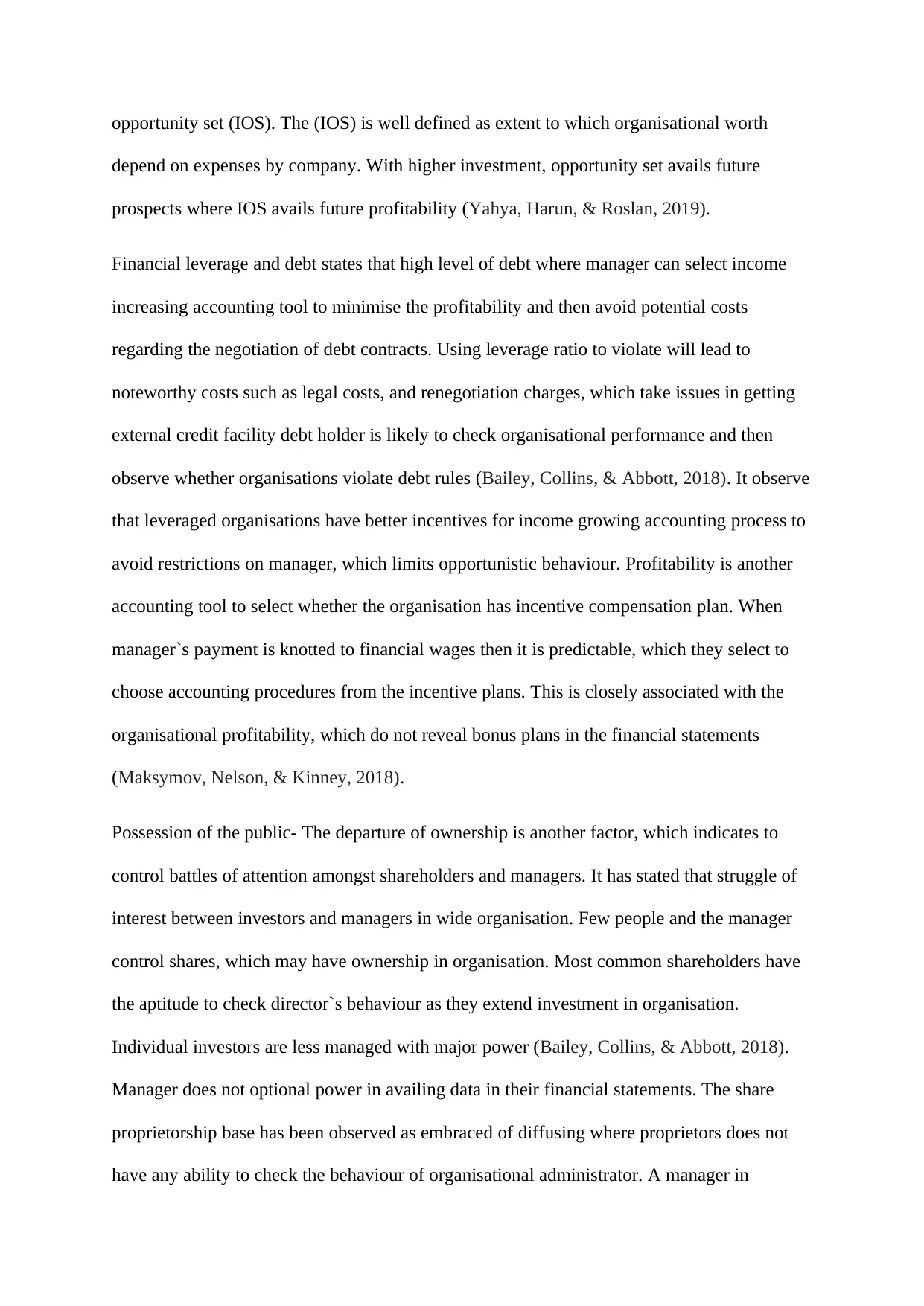
opportunity set (IOS). The (IOS) is well defined as extent to which organisational worth
depend on expenses by company. With higher investment, opportunity set avails future
prospects where IOS avails future profitability (Yahya, Harun, & Roslan, 2019).
Financial leverage and debt states that high level of debt where manager can select income
increasing accounting tool to minimise the profitability and then avoid potential costs
regarding the negotiation of debt contracts. Using leverage ratio to violate will lead to
noteworthy costs such as legal costs, and renegotiation charges, which take issues in getting
external credit facility debt holder is likely to check organisational performance and then
observe whether organisations violate debt rules (Bailey, Collins, & Abbott, 2018). It observe
that leveraged organisations have better incentives for income growing accounting process to
avoid restrictions on manager, which limits opportunistic behaviour. Profitability is another
accounting tool to select whether the organisation has incentive compensation plan. When
manager`s payment is knotted to financial wages then it is predictable, which they select to
choose accounting procedures from the incentive plans. This is closely associated with the
organisational profitability, which do not reveal bonus plans in the financial statements
(Maksymov, Nelson, & Kinney, 2018).
Possession of the public- The departure of ownership is another factor, which indicates to
control battles of attention amongst shareholders and managers. It has stated that struggle of
interest between investors and managers in wide organisation. Few people and the manager
control shares, which may have ownership in organisation. Most common shareholders have
the aptitude to check director`s behaviour as they extend investment in organisation.
Individual investors are less managed with major power (Bailey, Collins, & Abbott, 2018).
Manager does not optional power in availing data in their financial statements. The share
proprietorship base has been observed as embraced of diffusing where proprietors does not
have any ability to check the behaviour of organisational administrator. A manager in
depend on expenses by company. With higher investment, opportunity set avails future
prospects where IOS avails future profitability (Yahya, Harun, & Roslan, 2019).
Financial leverage and debt states that high level of debt where manager can select income
increasing accounting tool to minimise the profitability and then avoid potential costs
regarding the negotiation of debt contracts. Using leverage ratio to violate will lead to
noteworthy costs such as legal costs, and renegotiation charges, which take issues in getting
external credit facility debt holder is likely to check organisational performance and then
observe whether organisations violate debt rules (Bailey, Collins, & Abbott, 2018). It observe
that leveraged organisations have better incentives for income growing accounting process to
avoid restrictions on manager, which limits opportunistic behaviour. Profitability is another
accounting tool to select whether the organisation has incentive compensation plan. When
manager`s payment is knotted to financial wages then it is predictable, which they select to
choose accounting procedures from the incentive plans. This is closely associated with the
organisational profitability, which do not reveal bonus plans in the financial statements
(Maksymov, Nelson, & Kinney, 2018).
Possession of the public- The departure of ownership is another factor, which indicates to
control battles of attention amongst shareholders and managers. It has stated that struggle of
interest between investors and managers in wide organisation. Few people and the manager
control shares, which may have ownership in organisation. Most common shareholders have
the aptitude to check director`s behaviour as they extend investment in organisation.
Individual investors are less managed with major power (Bailey, Collins, & Abbott, 2018).
Manager does not optional power in availing data in their financial statements. The share
proprietorship base has been observed as embraced of diffusing where proprietors does not
have any ability to check the behaviour of organisational administrator. A manager in
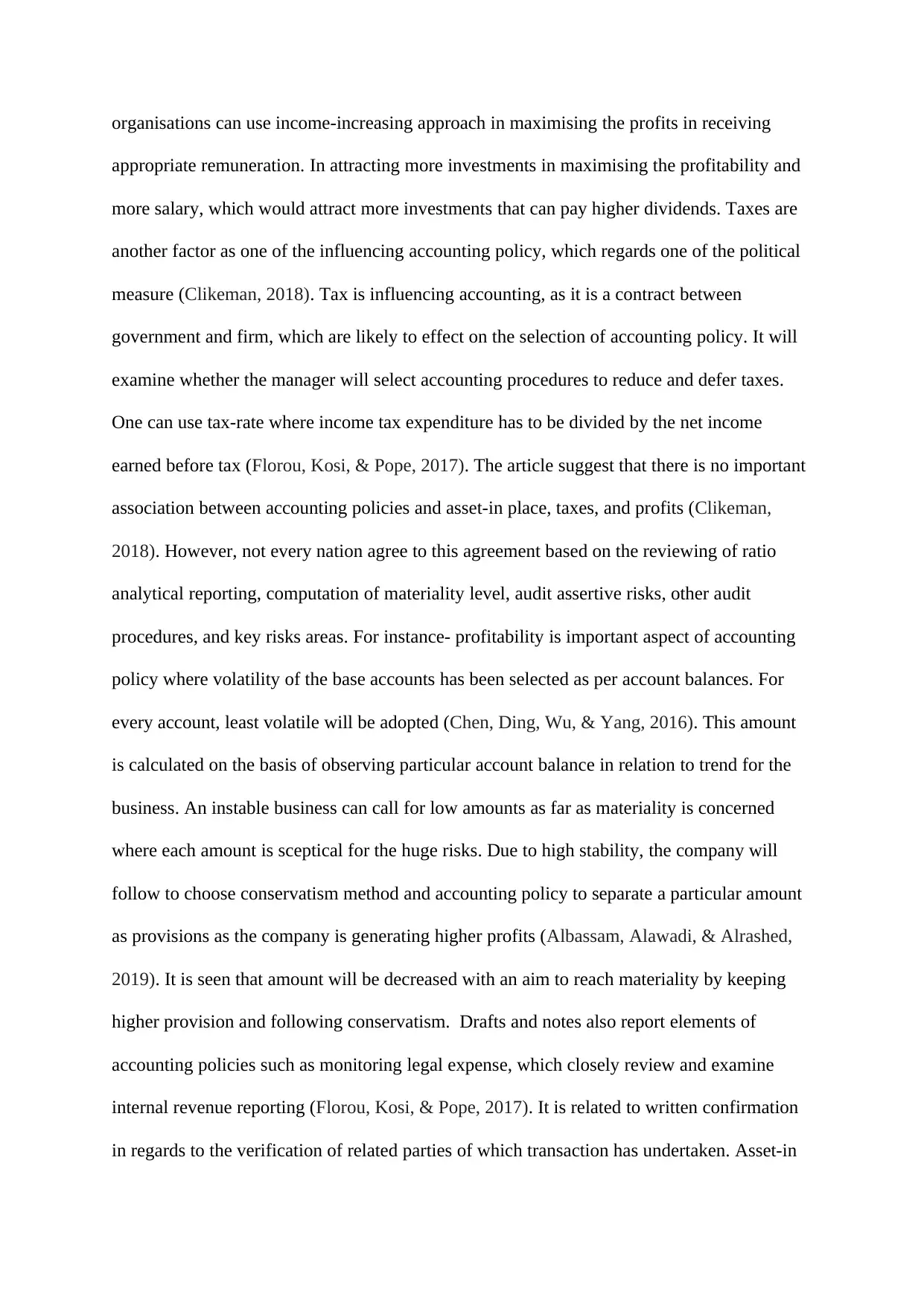
organisations can use income-increasing approach in maximising the profits in receiving
appropriate remuneration. In attracting more investments in maximising the profitability and
more salary, which would attract more investments that can pay higher dividends. Taxes are
another factor as one of the influencing accounting policy, which regards one of the political
measure (Clikeman, 2018). Tax is influencing accounting, as it is a contract between
government and firm, which are likely to effect on the selection of accounting policy. It will
examine whether the manager will select accounting procedures to reduce and defer taxes.
One can use tax-rate where income tax expenditure has to be divided by the net income
earned before tax (Florou, Kosi, & Pope, 2017). The article suggest that there is no important
association between accounting policies and asset-in place, taxes, and profits (Clikeman,
2018). However, not every nation agree to this agreement based on the reviewing of ratio
analytical reporting, computation of materiality level, audit assertive risks, other audit
procedures, and key risks areas. For instance- profitability is important aspect of accounting
policy where volatility of the base accounts has been selected as per account balances. For
every account, least volatile will be adopted (Chen, Ding, Wu, & Yang, 2016). This amount
is calculated on the basis of observing particular account balance in relation to trend for the
business. An instable business can call for low amounts as far as materiality is concerned
where each amount is sceptical for the huge risks. Due to high stability, the company will
follow to choose conservatism method and accounting policy to separate a particular amount
as provisions as the company is generating higher profits (Albassam, Alawadi, & Alrashed,
2019). It is seen that amount will be decreased with an aim to reach materiality by keeping
higher provision and following conservatism. Drafts and notes also report elements of
accounting policies such as monitoring legal expense, which closely review and examine
internal revenue reporting (Florou, Kosi, & Pope, 2017). It is related to written confirmation
in regards to the verification of related parties of which transaction has undertaken. Asset-in
appropriate remuneration. In attracting more investments in maximising the profitability and
more salary, which would attract more investments that can pay higher dividends. Taxes are
another factor as one of the influencing accounting policy, which regards one of the political
measure (Clikeman, 2018). Tax is influencing accounting, as it is a contract between
government and firm, which are likely to effect on the selection of accounting policy. It will
examine whether the manager will select accounting procedures to reduce and defer taxes.
One can use tax-rate where income tax expenditure has to be divided by the net income
earned before tax (Florou, Kosi, & Pope, 2017). The article suggest that there is no important
association between accounting policies and asset-in place, taxes, and profits (Clikeman,
2018). However, not every nation agree to this agreement based on the reviewing of ratio
analytical reporting, computation of materiality level, audit assertive risks, other audit
procedures, and key risks areas. For instance- profitability is important aspect of accounting
policy where volatility of the base accounts has been selected as per account balances. For
every account, least volatile will be adopted (Chen, Ding, Wu, & Yang, 2016). This amount
is calculated on the basis of observing particular account balance in relation to trend for the
business. An instable business can call for low amounts as far as materiality is concerned
where each amount is sceptical for the huge risks. Due to high stability, the company will
follow to choose conservatism method and accounting policy to separate a particular amount
as provisions as the company is generating higher profits (Albassam, Alawadi, & Alrashed,
2019). It is seen that amount will be decreased with an aim to reach materiality by keeping
higher provision and following conservatism. Drafts and notes also report elements of
accounting policies such as monitoring legal expense, which closely review and examine
internal revenue reporting (Florou, Kosi, & Pope, 2017). It is related to written confirmation
in regards to the verification of related parties of which transaction has undertaken. Asset-in
Paraphrase This Document
Need a fresh take? Get an instant paraphrase of this document with our AI Paraphraser
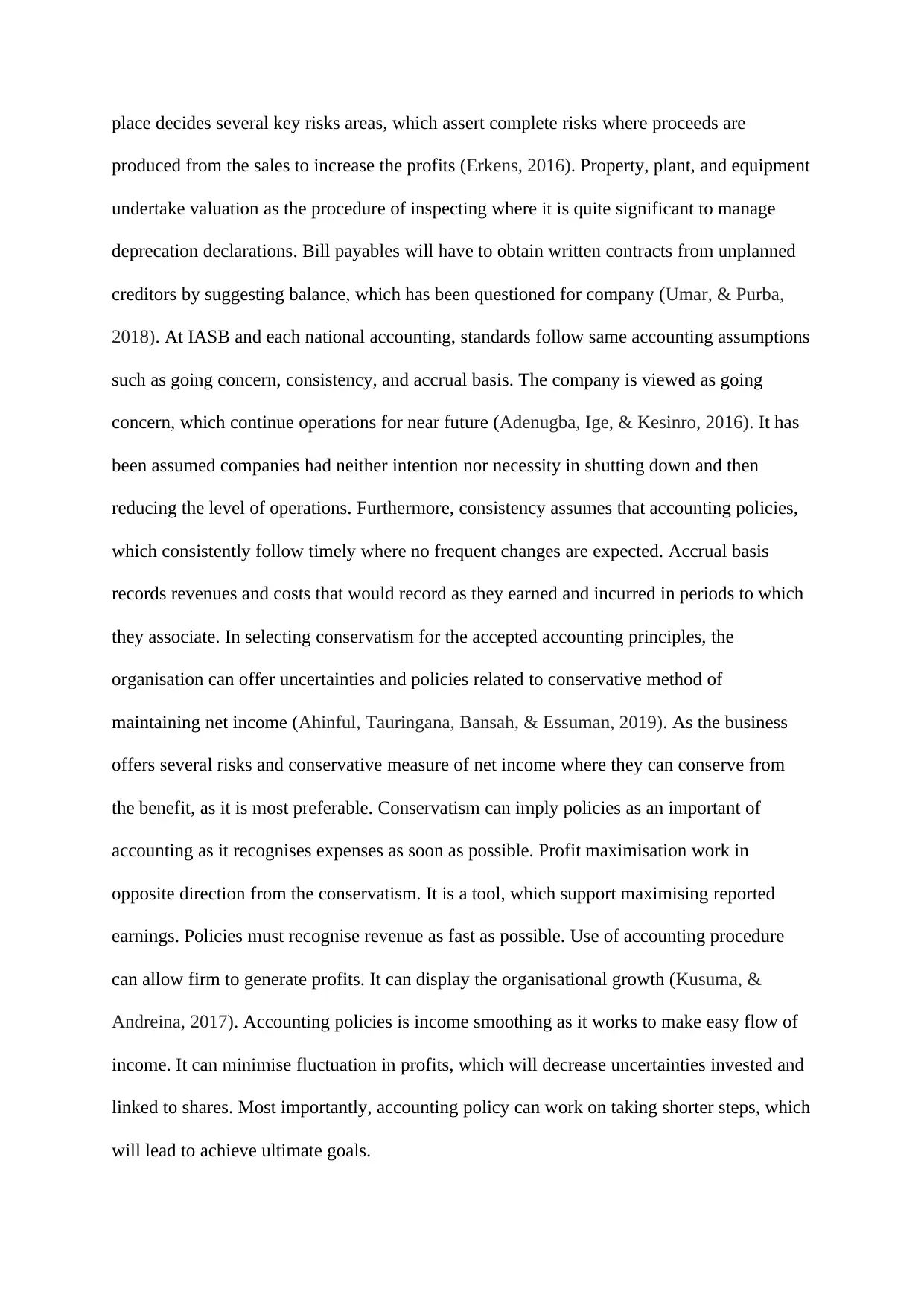
place decides several key risks areas, which assert complete risks where proceeds are
produced from the sales to increase the profits (Erkens, 2016). Property, plant, and equipment
undertake valuation as the procedure of inspecting where it is quite significant to manage
deprecation declarations. Bill payables will have to obtain written contracts from unplanned
creditors by suggesting balance, which has been questioned for company (Umar, & Purba,
2018). At IASB and each national accounting, standards follow same accounting assumptions
such as going concern, consistency, and accrual basis. The company is viewed as going
concern, which continue operations for near future (Adenugba, Ige, & Kesinro, 2016). It has
been assumed companies had neither intention nor necessity in shutting down and then
reducing the level of operations. Furthermore, consistency assumes that accounting policies,
which consistently follow timely where no frequent changes are expected. Accrual basis
records revenues and costs that would record as they earned and incurred in periods to which
they associate. In selecting conservatism for the accepted accounting principles, the
organisation can offer uncertainties and policies related to conservative method of
maintaining net income (Ahinful, Tauringana, Bansah, & Essuman, 2019). As the business
offers several risks and conservative measure of net income where they can conserve from
the benefit, as it is most preferable. Conservatism can imply policies as an important of
accounting as it recognises expenses as soon as possible. Profit maximisation work in
opposite direction from the conservatism. It is a tool, which support maximising reported
earnings. Policies must recognise revenue as fast as possible. Use of accounting procedure
can allow firm to generate profits. It can display the organisational growth (Kusuma, &
Andreina, 2017). Accounting policies is income smoothing as it works to make easy flow of
income. It can minimise fluctuation in profits, which will decrease uncertainties invested and
linked to shares. Most importantly, accounting policy can work on taking shorter steps, which
will lead to achieve ultimate goals.
produced from the sales to increase the profits (Erkens, 2016). Property, plant, and equipment
undertake valuation as the procedure of inspecting where it is quite significant to manage
deprecation declarations. Bill payables will have to obtain written contracts from unplanned
creditors by suggesting balance, which has been questioned for company (Umar, & Purba,
2018). At IASB and each national accounting, standards follow same accounting assumptions
such as going concern, consistency, and accrual basis. The company is viewed as going
concern, which continue operations for near future (Adenugba, Ige, & Kesinro, 2016). It has
been assumed companies had neither intention nor necessity in shutting down and then
reducing the level of operations. Furthermore, consistency assumes that accounting policies,
which consistently follow timely where no frequent changes are expected. Accrual basis
records revenues and costs that would record as they earned and incurred in periods to which
they associate. In selecting conservatism for the accepted accounting principles, the
organisation can offer uncertainties and policies related to conservative method of
maintaining net income (Ahinful, Tauringana, Bansah, & Essuman, 2019). As the business
offers several risks and conservative measure of net income where they can conserve from
the benefit, as it is most preferable. Conservatism can imply policies as an important of
accounting as it recognises expenses as soon as possible. Profit maximisation work in
opposite direction from the conservatism. It is a tool, which support maximising reported
earnings. Policies must recognise revenue as fast as possible. Use of accounting procedure
can allow firm to generate profits. It can display the organisational growth (Kusuma, &
Andreina, 2017). Accounting policies is income smoothing as it works to make easy flow of
income. It can minimise fluctuation in profits, which will decrease uncertainties invested and
linked to shares. Most importantly, accounting policy can work on taking shorter steps, which
will lead to achieve ultimate goals.
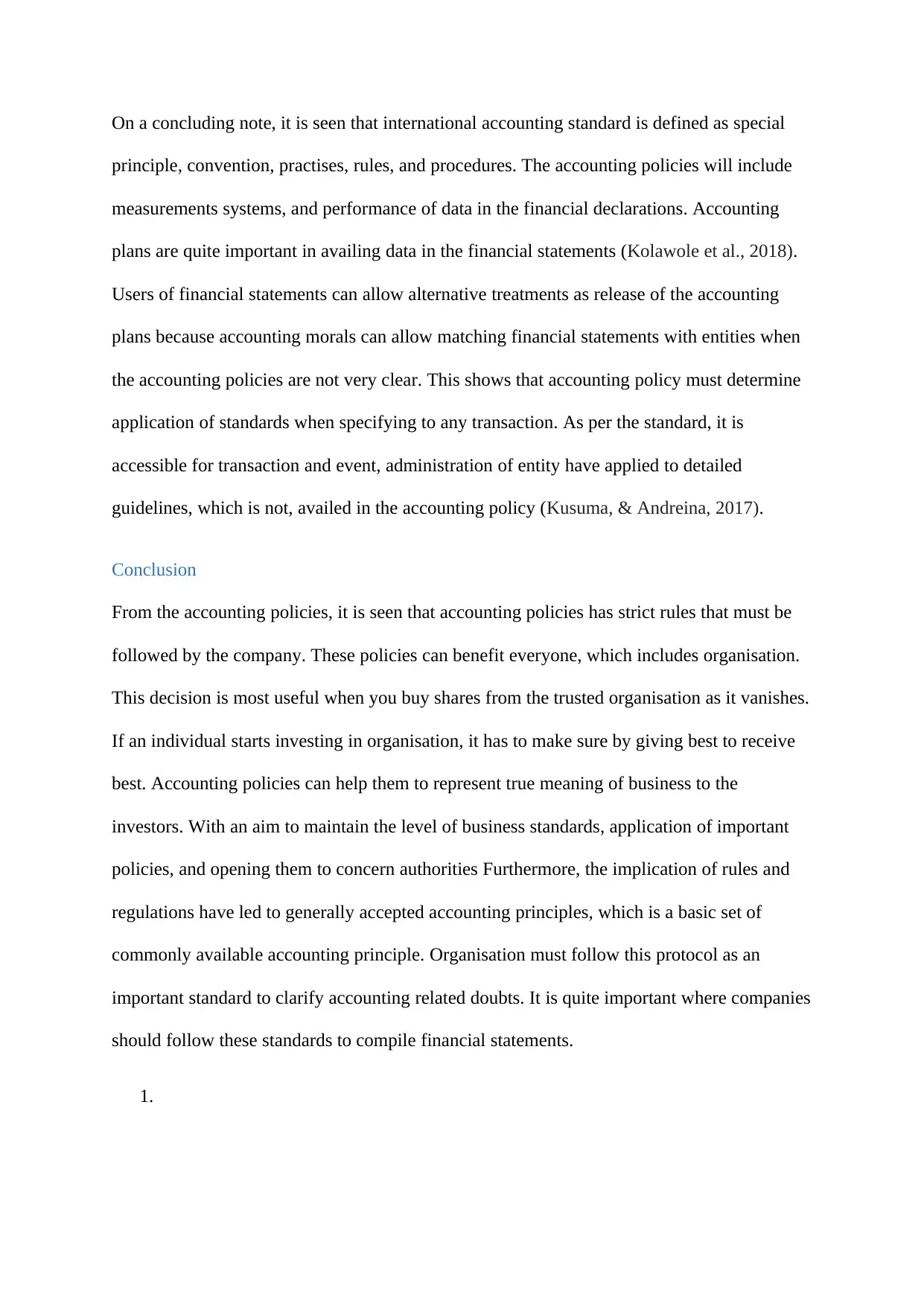
On a concluding note, it is seen that international accounting standard is defined as special
principle, convention, practises, rules, and procedures. The accounting policies will include
measurements systems, and performance of data in the financial declarations. Accounting
plans are quite important in availing data in the financial statements (Kolawole et al., 2018).
Users of financial statements can allow alternative treatments as release of the accounting
plans because accounting morals can allow matching financial statements with entities when
the accounting policies are not very clear. This shows that accounting policy must determine
application of standards when specifying to any transaction. As per the standard, it is
accessible for transaction and event, administration of entity have applied to detailed
guidelines, which is not, availed in the accounting policy (Kusuma, & Andreina, 2017).
Conclusion
From the accounting policies, it is seen that accounting policies has strict rules that must be
followed by the company. These policies can benefit everyone, which includes organisation.
This decision is most useful when you buy shares from the trusted organisation as it vanishes.
If an individual starts investing in organisation, it has to make sure by giving best to receive
best. Accounting policies can help them to represent true meaning of business to the
investors. With an aim to maintain the level of business standards, application of important
policies, and opening them to concern authorities Furthermore, the implication of rules and
regulations have led to generally accepted accounting principles, which is a basic set of
commonly available accounting principle. Organisation must follow this protocol as an
important standard to clarify accounting related doubts. It is quite important where companies
should follow these standards to compile financial statements.
1.
principle, convention, practises, rules, and procedures. The accounting policies will include
measurements systems, and performance of data in the financial declarations. Accounting
plans are quite important in availing data in the financial statements (Kolawole et al., 2018).
Users of financial statements can allow alternative treatments as release of the accounting
plans because accounting morals can allow matching financial statements with entities when
the accounting policies are not very clear. This shows that accounting policy must determine
application of standards when specifying to any transaction. As per the standard, it is
accessible for transaction and event, administration of entity have applied to detailed
guidelines, which is not, availed in the accounting policy (Kusuma, & Andreina, 2017).
Conclusion
From the accounting policies, it is seen that accounting policies has strict rules that must be
followed by the company. These policies can benefit everyone, which includes organisation.
This decision is most useful when you buy shares from the trusted organisation as it vanishes.
If an individual starts investing in organisation, it has to make sure by giving best to receive
best. Accounting policies can help them to represent true meaning of business to the
investors. With an aim to maintain the level of business standards, application of important
policies, and opening them to concern authorities Furthermore, the implication of rules and
regulations have led to generally accepted accounting principles, which is a basic set of
commonly available accounting principle. Organisation must follow this protocol as an
important standard to clarify accounting related doubts. It is quite important where companies
should follow these standards to compile financial statements.
1.
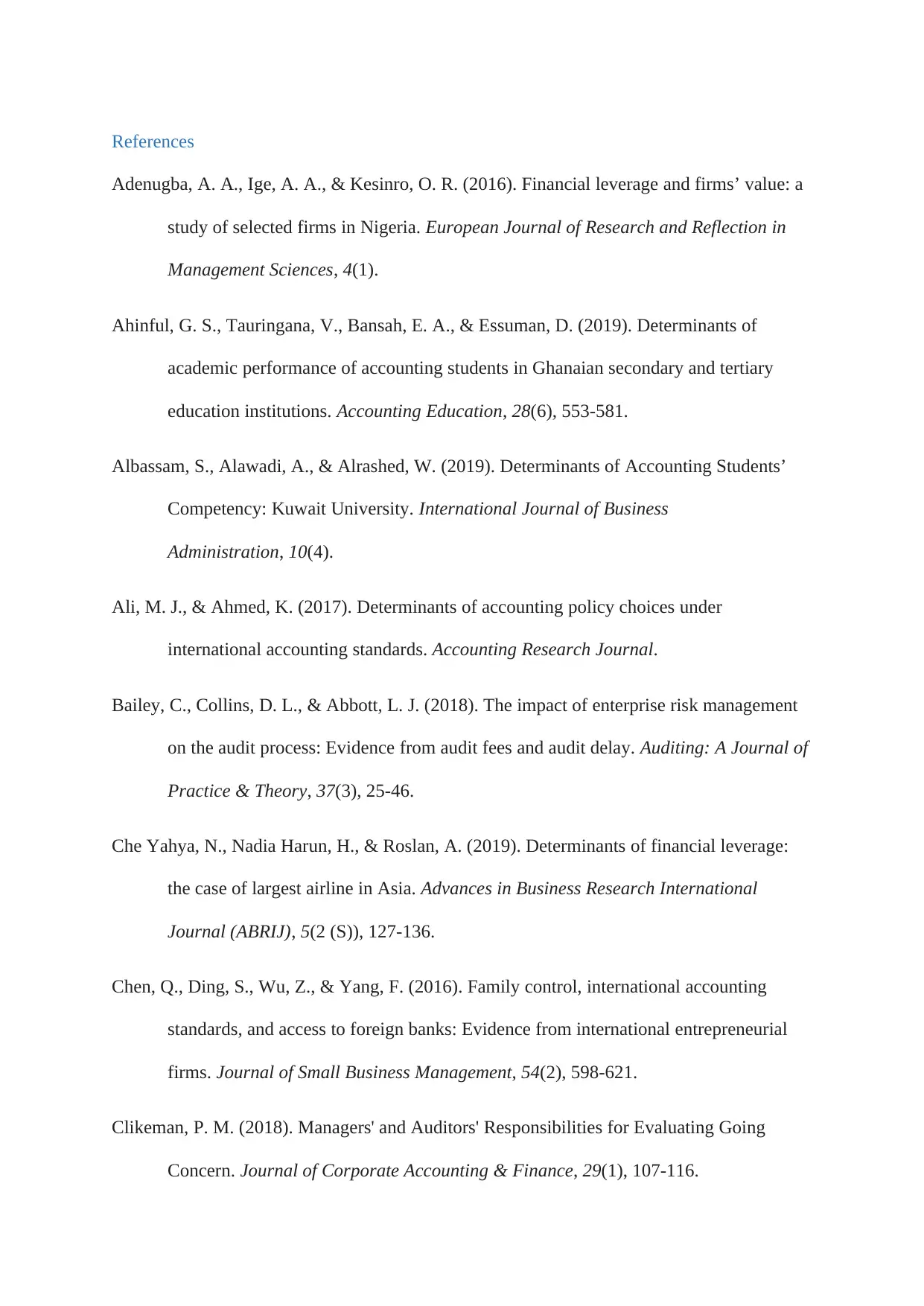
References
Adenugba, A. A., Ige, A. A., & Kesinro, O. R. (2016). Financial leverage and firms’ value: a
study of selected firms in Nigeria. European Journal of Research and Reflection in
Management Sciences, 4(1).
Ahinful, G. S., Tauringana, V., Bansah, E. A., & Essuman, D. (2019). Determinants of
academic performance of accounting students in Ghanaian secondary and tertiary
education institutions. Accounting Education, 28(6), 553-581.
Albassam, S., Alawadi, A., & Alrashed, W. (2019). Determinants of Accounting Students’
Competency: Kuwait University. International Journal of Business
Administration, 10(4).
Ali, M. J., & Ahmed, K. (2017). Determinants of accounting policy choices under
international accounting standards. Accounting Research Journal.
Bailey, C., Collins, D. L., & Abbott, L. J. (2018). The impact of enterprise risk management
on the audit process: Evidence from audit fees and audit delay. Auditing: A Journal of
Practice & Theory, 37(3), 25-46.
Che Yahya, N., Nadia Harun, H., & Roslan, A. (2019). Determinants of financial leverage:
the case of largest airline in Asia. Advances in Business Research International
Journal (ABRIJ), 5(2 (S)), 127-136.
Chen, Q., Ding, S., Wu, Z., & Yang, F. (2016). Family control, international accounting
standards, and access to foreign banks: Evidence from international entrepreneurial
firms. Journal of Small Business Management, 54(2), 598-621.
Clikeman, P. M. (2018). Managers' and Auditors' Responsibilities for Evaluating Going
Concern. Journal of Corporate Accounting & Finance, 29(1), 107-116.
Adenugba, A. A., Ige, A. A., & Kesinro, O. R. (2016). Financial leverage and firms’ value: a
study of selected firms in Nigeria. European Journal of Research and Reflection in
Management Sciences, 4(1).
Ahinful, G. S., Tauringana, V., Bansah, E. A., & Essuman, D. (2019). Determinants of
academic performance of accounting students in Ghanaian secondary and tertiary
education institutions. Accounting Education, 28(6), 553-581.
Albassam, S., Alawadi, A., & Alrashed, W. (2019). Determinants of Accounting Students’
Competency: Kuwait University. International Journal of Business
Administration, 10(4).
Ali, M. J., & Ahmed, K. (2017). Determinants of accounting policy choices under
international accounting standards. Accounting Research Journal.
Bailey, C., Collins, D. L., & Abbott, L. J. (2018). The impact of enterprise risk management
on the audit process: Evidence from audit fees and audit delay. Auditing: A Journal of
Practice & Theory, 37(3), 25-46.
Che Yahya, N., Nadia Harun, H., & Roslan, A. (2019). Determinants of financial leverage:
the case of largest airline in Asia. Advances in Business Research International
Journal (ABRIJ), 5(2 (S)), 127-136.
Chen, Q., Ding, S., Wu, Z., & Yang, F. (2016). Family control, international accounting
standards, and access to foreign banks: Evidence from international entrepreneurial
firms. Journal of Small Business Management, 54(2), 598-621.
Clikeman, P. M. (2018). Managers' and Auditors' Responsibilities for Evaluating Going
Concern. Journal of Corporate Accounting & Finance, 29(1), 107-116.
Secure Best Marks with AI Grader
Need help grading? Try our AI Grader for instant feedback on your assignments.
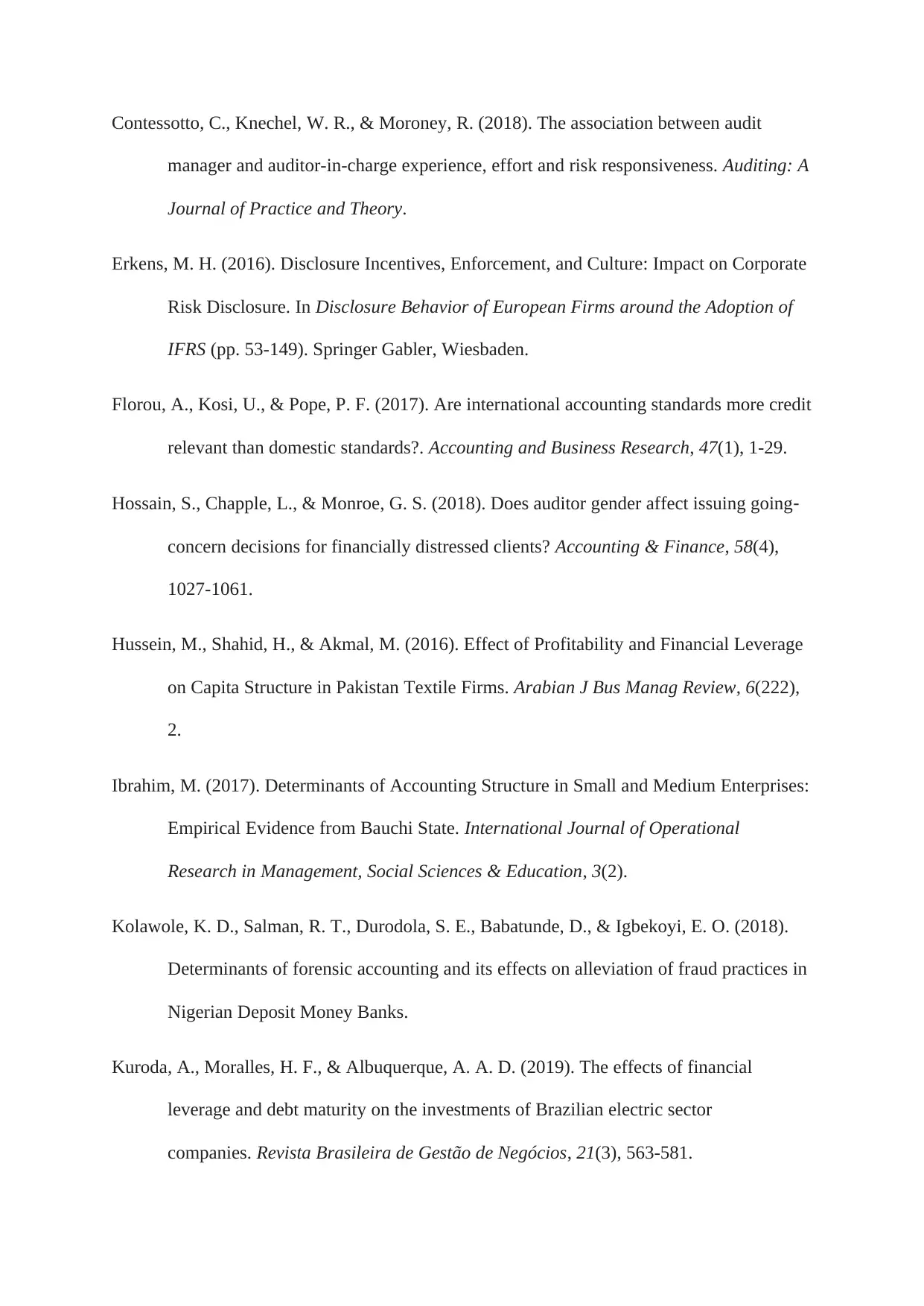
Contessotto, C., Knechel, W. R., & Moroney, R. (2018). The association between audit
manager and auditor-in-charge experience, effort and risk responsiveness. Auditing: A
Journal of Practice and Theory.
Erkens, M. H. (2016). Disclosure Incentives, Enforcement, and Culture: Impact on Corporate
Risk Disclosure. In Disclosure Behavior of European Firms around the Adoption of
IFRS (pp. 53-149). Springer Gabler, Wiesbaden.
Florou, A., Kosi, U., & Pope, P. F. (2017). Are international accounting standards more credit
relevant than domestic standards?. Accounting and Business Research, 47(1), 1-29.
Hossain, S., Chapple, L., & Monroe, G. S. (2018). Does auditor gender affect issuing going‐
concern decisions for financially distressed clients? Accounting & Finance, 58(4),
1027-1061.
Hussein, M., Shahid, H., & Akmal, M. (2016). Effect of Profitability and Financial Leverage
on Capita Structure in Pakistan Textile Firms. Arabian J Bus Manag Review, 6(222),
2.
Ibrahim, M. (2017). Determinants of Accounting Structure in Small and Medium Enterprises:
Empirical Evidence from Bauchi State. International Journal of Operational
Research in Management, Social Sciences & Education, 3(2).
Kolawole, K. D., Salman, R. T., Durodola, S. E., Babatunde, D., & Igbekoyi, E. O. (2018).
Determinants of forensic accounting and its effects on alleviation of fraud practices in
Nigerian Deposit Money Banks.
Kuroda, A., Moralles, H. F., & Albuquerque, A. A. D. (2019). The effects of financial
leverage and debt maturity on the investments of Brazilian electric sector
companies. Revista Brasileira de Gestão de Negócios, 21(3), 563-581.
manager and auditor-in-charge experience, effort and risk responsiveness. Auditing: A
Journal of Practice and Theory.
Erkens, M. H. (2016). Disclosure Incentives, Enforcement, and Culture: Impact on Corporate
Risk Disclosure. In Disclosure Behavior of European Firms around the Adoption of
IFRS (pp. 53-149). Springer Gabler, Wiesbaden.
Florou, A., Kosi, U., & Pope, P. F. (2017). Are international accounting standards more credit
relevant than domestic standards?. Accounting and Business Research, 47(1), 1-29.
Hossain, S., Chapple, L., & Monroe, G. S. (2018). Does auditor gender affect issuing going‐
concern decisions for financially distressed clients? Accounting & Finance, 58(4),
1027-1061.
Hussein, M., Shahid, H., & Akmal, M. (2016). Effect of Profitability and Financial Leverage
on Capita Structure in Pakistan Textile Firms. Arabian J Bus Manag Review, 6(222),
2.
Ibrahim, M. (2017). Determinants of Accounting Structure in Small and Medium Enterprises:
Empirical Evidence from Bauchi State. International Journal of Operational
Research in Management, Social Sciences & Education, 3(2).
Kolawole, K. D., Salman, R. T., Durodola, S. E., Babatunde, D., & Igbekoyi, E. O. (2018).
Determinants of forensic accounting and its effects on alleviation of fraud practices in
Nigerian Deposit Money Banks.
Kuroda, A., Moralles, H. F., & Albuquerque, A. A. D. (2019). The effects of financial
leverage and debt maturity on the investments of Brazilian electric sector
companies. Revista Brasileira de Gestão de Negócios, 21(3), 563-581.
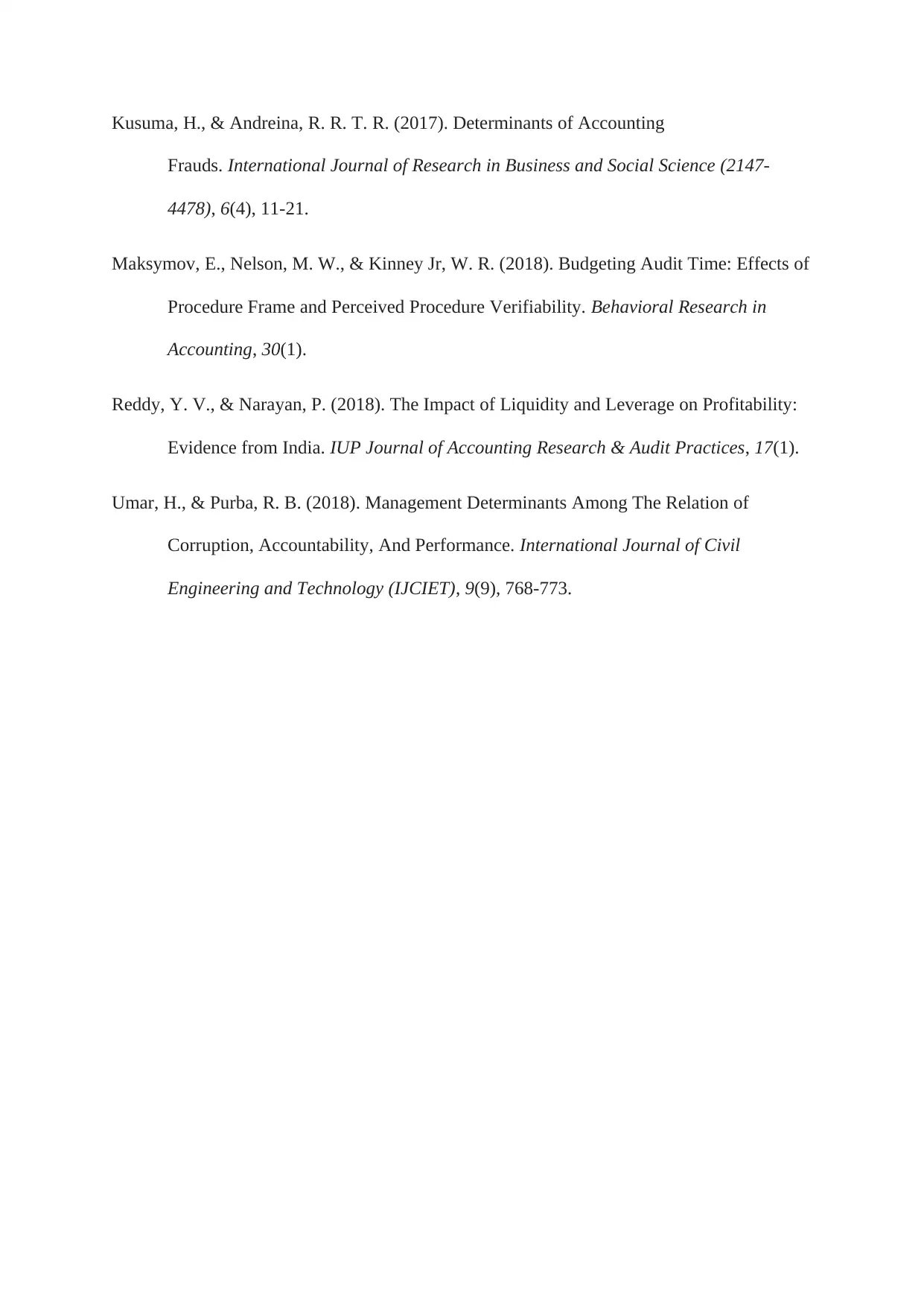
Kusuma, H., & Andreina, R. R. T. R. (2017). Determinants of Accounting
Frauds. International Journal of Research in Business and Social Science (2147-
4478), 6(4), 11-21.
Maksymov, E., Nelson, M. W., & Kinney Jr, W. R. (2018). Budgeting Audit Time: Effects of
Procedure Frame and Perceived Procedure Verifiability. Behavioral Research in
Accounting, 30(1).
Reddy, Y. V., & Narayan, P. (2018). The Impact of Liquidity and Leverage on Profitability:
Evidence from India. IUP Journal of Accounting Research & Audit Practices, 17(1).
Umar, H., & Purba, R. B. (2018). Management Determinants Among The Relation of
Corruption, Accountability, And Performance. International Journal of Civil
Engineering and Technology (IJCIET), 9(9), 768-773.
Frauds. International Journal of Research in Business and Social Science (2147-
4478), 6(4), 11-21.
Maksymov, E., Nelson, M. W., & Kinney Jr, W. R. (2018). Budgeting Audit Time: Effects of
Procedure Frame and Perceived Procedure Verifiability. Behavioral Research in
Accounting, 30(1).
Reddy, Y. V., & Narayan, P. (2018). The Impact of Liquidity and Leverage on Profitability:
Evidence from India. IUP Journal of Accounting Research & Audit Practices, 17(1).
Umar, H., & Purba, R. B. (2018). Management Determinants Among The Relation of
Corruption, Accountability, And Performance. International Journal of Civil
Engineering and Technology (IJCIET), 9(9), 768-773.
1 out of 12
Related Documents
Your All-in-One AI-Powered Toolkit for Academic Success.
+13062052269
info@desklib.com
Available 24*7 on WhatsApp / Email
![[object Object]](/_next/static/media/star-bottom.7253800d.svg)
Unlock your academic potential
© 2024 | Zucol Services PVT LTD | All rights reserved.




